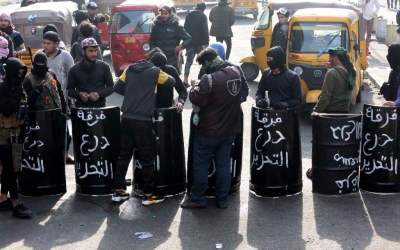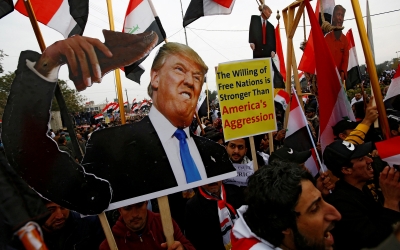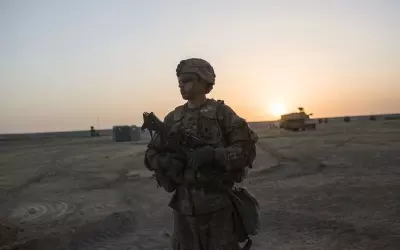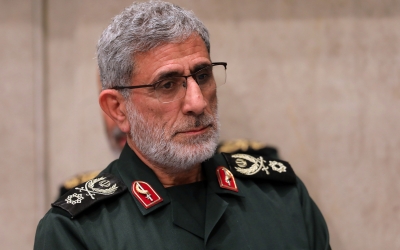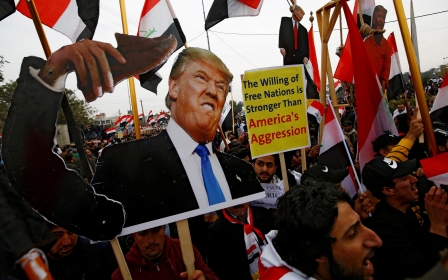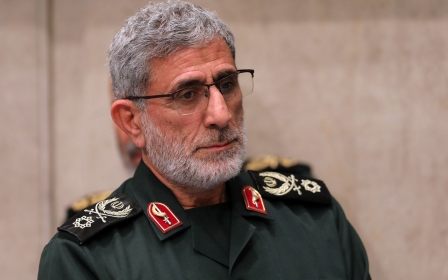Three rockets strike US embassy in protest-hit Iraqi capital Baghdad
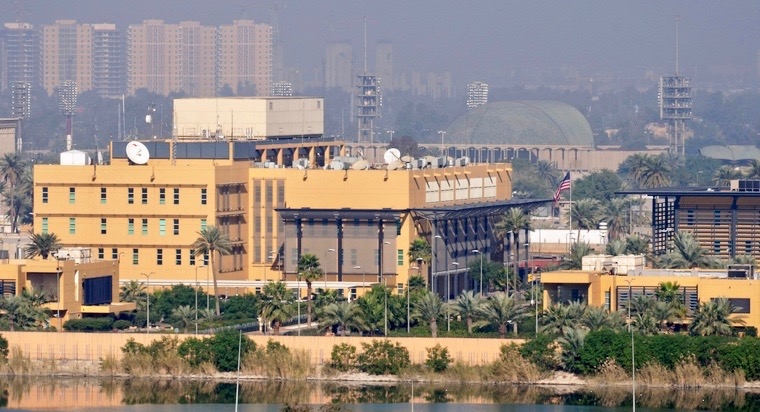
Three rockets slammed into the US embassy in Iraq's capital on Sunday in the first direct hit reported after months of close calls, as thousands kept up anti-government sit-ins across the country.
The attack marked a dangerous escalation in the spree of rocket attacks in recent months that have targeted the embassy or Iraqi military bases where American troops are deployed. At least one person was wounded, a senior Iraqi official told AFP on condition of anonymity.
The US embassy did not respond to requests for comment and it was not immediately clear whether the injured person was an American national or an Iraqi staff member working at the mission. Later, the US called on Iraq to protect American diplomatic facilities. "We call on the Government of Iraq to fulfill its obligations to protect our diplomatic facilities," a State Department spokesperson said in a statement.
"Since September there have been over 14 attacks by Iran and Iranian-supported militias on US personnel in Iraq," the State Department spokesperson said.
None of the attacks has been claimed but Washington has repeatedly blamed Iran-backed military factions in Iraq.
A US official told CNN on Sunday that one rocket hit a dining facility on the embassy compound. Neither the Pentagon nor the State Department had made public any reports of injuries and had not returned requests from CNN for comment on the incident.
Kurdish politician and Iraq’s former foreign affairs and finance minister, Hoshyar Zebari, said in a tweet that the "Embassy restaurant or canteen was damaged and burned” in the strike, according to Kurdistan 24.
“This is a very dangerous game by #PMF uncontrolled factions to galvanize the tense situation,” he added, referring to the Iranian-backed Hashd al-Shaabi militias, also called the Popular Mobilisation Forces.
The attack took place earlier in the day than usual, with AFP reporters hearing the booms on the western bank of the Tigris River at precisely 7:30pm local time (1630 GMT).
Iraqi caretaker Prime Minister Adel Abdul Mahdi and Speaker of Parliament Mohammed Halbousi both condemned the incident, saying it risked dragging their homeland into war.
Iraq has already been dragged into a worrying tit-for-tat between the United States and Iran over the last month.
A similar attack on a northern Iraqi base killed an American contractor, and the US retaliated with a strike on an Iran-backed faction known as Kataeb Hezbollah.
Less than a week later, a US drone strike killed Iranian general Qasem Soleimani and Iraqi military figure Abu Mahdi al-Muhandis outside the Baghdad airport - prompting Iran to fire ballistic missiles at an Iraqi base where US troops are stationed.
About 5,200 Americans are stationed in Iraq to lead the global coalition fighting the Islamic State group, but the US strike on Baghdad has rallied top Iraqi figures around a joint call to order them out.
Vehemently anti-American cleric Moqtada Sadr organised a mass rally in Baghdad on Friday, where thousands of his supporters called for American troops to leave.
Sadr had previously backed separate anti-government protests sweeping Iraq's capital and south, even though he controls the largest bloc in parliament and top ministerial posts.
Bolstered by his own protest on Friday, Sadr announced he was dropping support for the youth-dominated reform campaign rocking the country since October.
His followers, widely regarded as the best-organised and well-stocked of the anti-government demonstrators, immediately began dismantling their tents and heading home.
"We protest because we have a cause. I don’t think Moqtada Sadr or any other politician will change our mind," a protester in Baghdad who declined to give his name told Reuters.
Still, activists feared that without his political cover, authorities would move to crush their movement - and indeed, within hours, riot police tried to storm protest camps across the capital and south.
Those efforts continued into Sunday, as Iraqi security forces fired tear gas and live bullets in clashes with protesters angered by high-level corruption who resisted with stones and petrol bombs, Reuters witnesses and security sources said.
One protester was shot dead in Baghdad and another in the flashpoint southern city of Nasiriyah, medical sources said, and dozens more were wounded across the country.
Despite the renewed violence, thousands of students flooded the streets in the capital and across the south in a bid to keep national attention focused on their demands.
"Only for you, Iraq!" read a sign held by a young protester in the shrine city of Karbala, hinting at the movement's insistence on not being affiliated with any political party or outside backer.
In Basra, hundreds of students gathered to condemn the riot police's dismantling of their main protest camp the previous day, according to an AFP correspondent.
In Baghdad, university students marched from a campus in the city centre to the main rally area of Tahrir Square.
Riot police fired live rounds and tear gas at clusters of young protesters in the nearby Khallani and Wathba squares, but protesters threw rocks and Molotov cocktails to keep them back.
Security forces have stopped short of entering Tahrir Square, where some protesters stood their ground even after many tents were dismantled.
In Nasiriyah, security forces fired live rounds to disperse demonstrators angered by authorities pushing them out of roads around their main protest camp in Habbubi Square.
The youth-led protests erupted on 1 October in outrage over the lack of jobs, poor services and rampant corruption before spiralling into calls for a government overhaul after they were met with violence.
More than 470 people have died, a vast majority of them demonstrators, since the rallies erupted.
Protesters are now demanding snap elections, the appointment of an independent premier and the prosecution of anyone implicated in corruption or recent bloodshed.
Their voices have been heard by top UN envoy in Iraq Jeanine Hennis-Plasschaert who said: "Unaccountability and indecisiveness are unworthy of Iraqi hopes, courageously expressed for four months now."
"While death and injury tolls continue to rise, steps taken so far will remain hollow if not completed," she said on Saturday.
Middle East Eye propose une couverture et une analyse indépendantes et incomparables du Moyen-Orient, de l’Afrique du Nord et d’autres régions du monde. Pour en savoir plus sur la reprise de ce contenu et les frais qui s’appliquent, veuillez remplir ce formulaire [en anglais]. Pour en savoir plus sur MEE, cliquez ici [en anglais].


